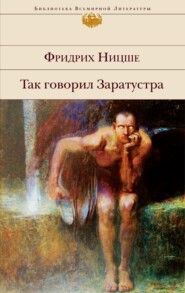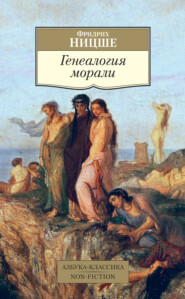По всем вопросам обращайтесь на: info@litportal.ru
(©) 2003-2024.
✖
Human, All-Too-Human: A Book For Free Spirits; Part II
Настройки чтения
Размер шрифта
Высота строк
Поля
A Sign of Love. – Some one said, “There are two persons about whom I have never thought deeply. That is a sign of my love for them.”
302
How we Seek to Improve Bad Arguments. – Many a man adds a bit of his personality to his bad arguments, as if they would thus go better and change into straight and good arguments. In the same way, players at skittles, even after a throw, try to give a direction to the ball by turns and gestures.
303
Honesty. – It is but a small thing to be a pattern sort of man with regard to rights and property – for instance (to name trifling points, which of course give a better proof of this sort of pattern nature than great examples), if as a boy one never steals fruit from another's orchard, and as a man never walks on unmown fields. It is but little; you are then still only a “law-abiding person,” with just that degree of morality of which a “society,” a group of human beings, is capable.
304
“Man!” – What is the vanity of the vainest individual as compared with the vanity which the most modest person feels when he thinks of his position in nature and in the world as “Man!”
305
The Most Necessary Gymnastic. – Through deficiency in self-control in small matters a similar deficiency on great occasions slowly arises. Every day on which we have not at least once denied ourselves some trifle is turned to bad use and a danger to the next day. This gymnastic is indispensable if we wish to maintain the joy of being our own master.
306
Losing Ourselves. – When we have first found ourselves, we must understand how from time to time to lose ourselves and then to find ourselves again. – This is true on the assumption that we are thinkers. A thinker finds it a drawback always to be tied to one person.
307
When it is Necessary to Part. – You must, for a time at least, part from that which you want to know and measure. Only when you have left a city do you see how high its towers rise above its houses.
308
At Noontide. – He to whom an active and stormy morning of life is allotted, at the noontide of life feels his soul overcome by a strange longing for a rest that may last for months and years. All grows silent around him, voices sound farther and farther in the distance, the sun shines straight down upon him. On a hidden woodland sward he sees the great God Pan sleeping, and with Pan Nature seems to him to have gone to sleep with an expression of eternity on their faces. He wants nothing, he troubles about nothing; his heart stands still, only his eye lives. It is a death with waking eyes. Then man sees much that he never saw before, and, so far as his eye can reach, all is woven into and as it were buried in a net of light. He feels happy, but it is a heavy, very heavy kind of happiness. – Then at last the wind stirs in the trees, noontide is over, life carries him away again, life with its blind eyes, and its tempestuous retinue behind it – desire, illusion, oblivion, enjoyment, destruction, decay. And so comes evening, more stormy and more active than was even the morning. – To the really active man these prolonged phases of cognition seem almost uncanny and morbid, but not unpleasant.
309
To Beware of One's Portrait-Painter. – A great painter, who in a portrait has revealed and put on canvas the fullest expression and look of which a man is capable, will almost always think, when he sees the man later in real life, that he is only looking at a caricature.
310
The Two Principles of the New Life. —First Principle: to arrange one's life on the most secure and tangible basis, not as hitherto upon the most distant, undetermined, and cloudy foundation. Second Principle: to establish the rank of the nearest and nearer things, and of the more and less secure, before one arranges one's life and directs it to a final end.
311
Dangerous Irritability. – Talented men who are at the same time idle will always appear somewhat irritated when one of their friends has accomplished a thorough piece of work. Their jealousy is awakened, they are ashamed of their own laziness, or rather, they fear that their active friend will now despise them even more than before. In such a mood they criticise the new achievement, and, to the utter astonishment of the author, their criticism becomes a revenge.
312
Destructions of Illusions. – Illusions are certainly expensive amusements; but the destruction of illusions is still more expensive, if looked upon as an amusement, as it undoubtedly is by some people.
313
The Monotone of the “Sage.” – Cows sometimes have a look of wondering which stops short on the path to questioning. In the eye of the higher intelligence, on the other hand, the nil admirari is spread out like the monotony of the cloudless sky.
314
Not to be Ill too Long. – We should beware of being ill too long. The lookers-on become impatient of their customary duty of showing sympathy, because they find it too much trouble to maintain the appearance of this emotion for any length of time. Then they immediately pass to suspicion of our character, with the conclusion: “You deserve to be ill, and we need no longer be at pains to show our sympathy.”
315
A Hint to Enthusiasts. – He who likes to be carried away, and would fain be carried on high, must beware lest he become too heavy. For instance, he must not learn much, and especially not let himself be crammed with science. Science makes men ponderous – take care, ye enthusiasts!
316
Knowledge of how to Surprise Oneself. – He who would see himself as he is, must know how to surprise himself, torch in hand. For with the mind it is as with the body: whoever is accustomed to look at himself in the glass forgets his ugliness, and only recognises it again by means of the portrait-painter. Yet he even grows used to the picture and forgets his ugliness all over again. – Herein we see the universal law that man cannot endure unalterable ugliness, unless for a moment. He forgets or denies it in all cases. – The moralists must reckon upon that “moment” for bringing forward their truths.
317
Opinions and Fish. – We are possessors of our opinions as of fish – that is, in so far as we are possessors of a fish pond. We must go fishing and have luck – then we have our fish, our opinions. I speak here of live opinions, of live fish. Others are content to possess a cabinet of fossils – and, in their head, “convictions.”
318
Signs of Freedom and Servitude. – To satisfy one's needs so far as possible oneself, even if imperfectly, is the path towards freedom in mind and personality. To satisfy many even superfluous needs, and that as fully as possible, is a training for servitude. The Sophist Hippias, who himself earned and made all that he wore within and without, is the representative of the highest freedom of mind and personality. It does not matter whether all is done equally well and perfectly – pride can repair the damaged places.
319
Belief in Oneself. – In our times we mistrust every one who believes in himself. Formerly this was enough to make people believe in one. The recipe for finding faith now runs: “Spare not thyself! In order to set thy opinion in a credible light, thou must first set fire to thy own hut!”
320
At Once Richer and Poorer. – I know a man who accustomed himself even in childhood to think well of the intellectuality of mankind – in other words, of their real devotion as regards things of the intellect, their unselfish preference for that which is recognised as true – but who had at the same time a modest or even depreciatory view of his own brain (judgment, memory, presence of mind, imagination). He set no value on himself when he compared himself with others. Now in the course of years he was compelled, first once and then in a hundred ways, to revise this verdict. One would have thought he would be thoroughly satisfied and delighted. Such, in fact, was to some extent the case, but, as he once said, “Yet a bitterness of the deepest dye is mingled with my feeling, such as I did not know in earlier life; for since I learnt to value men and myself more correctly, my intellect seems to me of less use. I scarcely think I can now do any good at all with it, because the minds of others cannot understand the good. I now always see before me the frightful gulf between those who could give help and those who need help. So I am troubled by the misfortune of having my intellect to myself and of being forced to enjoy it alone so far as it can give any enjoyment. But to give is more blessed than to possess, and what is the richest man in the solitude of a desert?”[28 - Clearly autobiographical. Nietzsche, like all great men, passed through a period of modesty and doubt. – Tr.]
321
How we should Attack. – The reasons for which men believe or do not believe are in very few people as strong as they might be. As a rule, in order to shake a belief it is far from necessary to use the heaviest weapon of attack. Many attain their object by merely making the attack with some noise – in fact, pop-guns are often enough. In dealing with very vain persons, the semblance of a strong attack is enough. They think they are being taken quite seriously, and readily give way.
322
Death. – Through the certain prospect of death a precious, fragrant drop of frivolity might be mixed with every life – and now, you singular druggist-souls, you have made of death a drop of poison, unpleasant to taste, which makes the whole of life hideous.
323
Repentance. – Never allow repentance free play, but say at once to yourself, “That would be adding a second piece of folly to the first.” If you have worked evil, you must bethink yourself of doing good. If you are punished for your actions, submit to the punishment with the feeling that by this very submission you are somehow doing good, in that you are deterring others from falling into the same error. Every malefactor who is punished has a right to consider himself a benefactor to mankind.
324
Becoming a Thinker. – How can any one become a thinker if he does not spend at least a third part of the day without passions, men, and books?
325
The Best Remedy. – A little health on and off is the best remedy for the invalid.
326

















